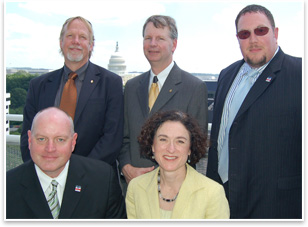AIA Partners with ICC to Develop a Green Construction
Code
Safe and Sustainable By the Book
With sustainability capturing the attention of state and local elected
officials nationally, the International Code Council (ICC) has partnered
with the AIA and ASTM International to co-author
a green building code for new and existing commercial construction.
Entitled the “International Green Construction Code: Safe &
Sustainable By the Book” (IGCC), the initiative is committed
to developing a model building code focused heavily on building design
and performance, recognizing that buildings consume approximately
40 percent of the energy used in the U.S. and produce about the same
amount of the nation’s carbon emissions.

Pictured at the press conference: (front, l to
r) Paul Mendelsohn, VP Government and Community Relations, AIA;
and Christine McEntee, CEO, AIA. (Back, l to r) Chris Green, AIA,
LEED-AP and Vice Chair, ICC Sustainable Building Technology Committee;
Peter Arsenault, AIA, LEED-AP, Vice President AIA Board of Directors;
and John J. Loyer, Director, AIA State Relations.
“We believe the time has come for us to develop a code that
will stand as a useful and credible regulatory framework for creating
a greener commercial building stock,” said ICC Chief Executive
Officer Richard P. Weiland. “We applaud and plan to utilize
the good work of those who have developed systems, guidelines and
standards to address green buildings.”
At a June 29 press conference in Washington, D.C.,
leaders from the partnering organizations acknowledged the work
of many other organizations that have developed “green tools” impacting
the built environment and welcomed their support and assistance in
crafting the new initiative. After recognizing the historic role
of their own respective members in the development of codes such
as the International
Energy Conservation Code and the rapid evolution of new systems
and guidelines to address green technology, all agreed that it was
time to move into a new era of codes that specifically focus on green
buildings and high performance.
“We are now at a place in the evolution of the sustainability
movement that requires the specificity, the reliability, and the
enforceability that only a code can bring,” said ICC Board
President Adolf Zubia as he outlined the Code Council’s development
timeline, which will include public meetings of the Sustainable Building
Technology Committee (SBTC), the newly formed ICC committee charged
with writing the actual draft of the code itself, a public comment
period on the committee’s initial draft, and a final draft
that will be made available in 2010 as a resource document before
it moves through the development hearing and final action hearing
stages. The new code will be published and ready for adoption by
2012.
The AIA will have very visible participation in the development
process, with several architects as voting members of the SBTC. While
attending the press event, SBTC Vice Chair Chris Green, AIA,
from Avon, Colo., said: “As an architect, the opportunity to
be involved with and influence the creation of a green building code
is a significant and exciting opportunity. This code will establish
the foundation for minimum green building standards for adoption
by all our communities in the United States. In fact, this code will
help shape the future practice of our profession and reinforce the
sustainable paradigm architect's are currently working toward.”
ICC CEO Weiland referenced the compatibility of the AIA 2030
carbon neutrality goals with the green code initiative, and emphasized
the importance of design, architects, and architecture in creating
a useful tool for AIA members as well as the ICC membership. AIA
Executive Vice President/CEO Christine McEntee made key remarks at
the launch event.
“The AIA commends the leadership of ICC and is delighted to
join with them and other stakeholders in working collaboratively
toward the goal of a model green construction code,” said McEntee. “It
is important for the private sector to be proactive and take a leadership
position in the development of building codes and standards, and
this initiative makes a strong statement regarding the usefulness
and necessity of the International Green Construction Code in fulfilling
that goal. As the team leader in determining the performance of buildings,
architects welcome the prospect of a reliable and quantifiable tool
that will be a valuable resource in helping advance our steadfast
commitment to achieving carbon neutrality by 2030.” |




